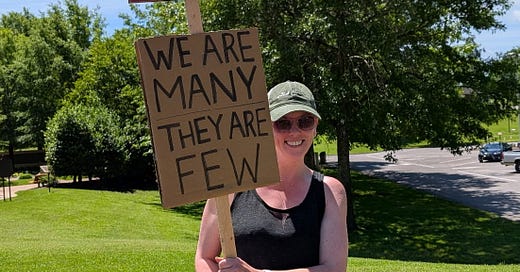Finding your place in the resistance
Because you can't take down autocracy without a few good spreadsheets
We’ve seen a lot of protests this year.
Impromptu actions at ICE raids, weekly gatherings in front of legislators’ offices and public buildings, and massive nationwide mobilizations. Hopefully, you’ve participated in one yourself at some point.
People are standing up and saying ‘enough’.
Enough bypassing Congress and ignoring the courts.
Enough unmasked men dragging our neighbors away in broad daylight.
Enough pillaging services for the most vulnerable among us and bowing down to Bezos, Musk, and the other Billionaire Bois.
As nervous as I was before my first big protest or two, my courage has been bolstered by the relationships I’ve built with others at these events. My creativity has been sparked by seeing how everyone brings their own strengths, skills, and talents to the fight. My hope in humanity has been ever so slightly rekindled with every encouraging thumbs up and honk.
With that said, not everyone will be able to hit the streets and protest, and not everyone should. Some people will automatically be in more danger just because of who they are. Some may not be physically healthy enough to participate, especially in the heat of summer. Plenty of us will miss protest times because we’re working, going to school, or caring for others.
If you’re able to join a protest, please do. For yourself and for the movement as a whole.
But if you aren’t, you don’t feel safe doing so, or if you have joined in plenty and now you want to go beyond just protesting to do something more… rest assured, there are plenty of other ways for you to get involved.
First, there’s a whole lot to be said for just being an engaged citizen. If each of us were only focused on being someone who seeks out well-rounded and truthful sources of information, doesn’t engage in the spread of misinformation, and votes in all local, state, and federal elections, that would go a long way toward holding the government in check.
Beyond those basics, though, consider your strengths. What are you naturally good at? What comes easily to you? Whatever it is, there’s probably a way to use it for good.
For example, every local group of activists needs someone good at behind-the-scenes admin work.
There is a shocking amount of admin involved in planning and executing a protest, or any kind of community action… acquiring permits, sending emails, maintaining a contact list, staying in touch with the media. These jobs shouldn’t all fall on one person, but if you’re a pro at mailing lists, marketing, web/graphic design, spreadsheets, or anything else you think might be beneficial, I highly recommend seeing if there is a group in your area that could use help in that area. You might be surprised how big of an impact you could make without ever going to an actual protest.
Likewise, if you’re an artist or writer, use your art.
Design protest signs for those who are able to get out in the streets. Connect with a local activist group and offer your skills to design postcards or write copy. Make pins, flags, buttons, stickers, and zines. Share them with your neighbors. Go to protests and hand them out. Use your skills to spread a message. Create postcards for your friends and neighbors to send to their representatives, or have a group of friends over and have a postcard-making party.
Use your voice
Call your senators. Especially if you’re one of those people who likes to talk, and doesn’t mind making phone calls (those of us who hate it are in awe of you). Use that talent, friend. Call your representatives, leave messages for your senators, write them letters, send them emails, grab one of those postcards your artistic neighbor made, write a personal message on the back, then send it to your legislator. Cover them up with personal stories and tell them what we want from them. They work for us. Hold them accountable.
Dive into community care
To keep fighting the power, people need to be clothed, housed, fed, and healthy. Part of a successful resistance is creating new pathways to take care of each other on a local level while the politicians are actively working to cut services for the most vulnerable. If you want to focus on building something up instead of tearing down the system, find the needs in your community and join in with those trying to fill them. Help out at a food bank. Find a church delivering fruit to kids and volunteer. Create a list of free resources available in your community and pin it to every bulletin board you find.
Here are a few other things I’ve seen people do or have considered myself:
Offering to watch a friend’s or neighbor's kids so they can participate in a protest or event.
If you’re able, choose to spend your money with local businesses that share your values.
Don’t support corporations that don’t support your community.
Have open civil conversations with people you disagree with.
Pick an issue that’s important to you and educate yourself on it, then educate others.
This list isn’t inclusive by any means, but hopefully it will help open your eyes to the ways we can all participate in restoring and maintaining a civil society that works for us all.
The Resistance Garden is a free publication focused on all the small ways we, as individual citizens, can resist the rise of authoritarianism and build a more just society together. If you’ve found anything I’ve written helpful and want to show your support, I appreciate every like, share, and subscription. You can also buy me a coffee below, or browse zines and other products in my online shop. Thanks for reading!




